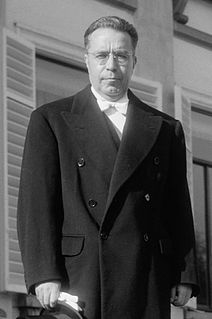The Ecuadorian Radical Liberal Party was a liberal party in Ecuador and is one of the oldest existing political parties in Ecuador.
This article gives an overview of liberal and radical parties in Chile. It is limited to liberal and radical parties with substantial support, mainly proved by having had a representation in parliament. The sign ⇒ means a reference to another party in that scheme. For inclusion in this scheme, parties do not necessarily need to have labeled themselves as a liberal party.

Ángel Víctor Paz Estenssoro was a Bolivian politician who served as President of Bolivia from 1952 to 1956, 1960 to 1964 and 1985 to 1989. He ran for president eight times and was victorious in 1951, 1960, 1964 and 1985. His 1951 victory was annulled by a military junta led by Hugo Ballivián, and his 1964 victory was interrupted by the 1964 Bolivian coup d'état.
This article gives an overview of liberalism in Cuba. It is limited to liberal parties with substantial support, mainly proved by having had a representation in parliament. The sign ⇒ means a reference to another party in that scheme. For inclusion in this scheme it isn't necessary so that parties labeled themselves as a liberal party.
This article gives an overview of political liberalism and radicalism in Ecuador. It is limited to liberal and radical parties with substantial support, mainly proved by having had representation in parliament. The sign ⇒ means a reference to another party in that scheme.
Since the beginning of liberalism in Portugal in the mid-19th century, several parties have, by gaining representation in parliament, continued the liberal ideology in contemporary Portuguese politics.
This article gives an overview of liberalism and radicalism in Spain. It is limited to liberal and radical parties with substantial support, mainly proved by having been represented in parliament. The sign ⇒ denotes another party in that scheme. For inclusion in this scheme it is not necessary that parties labeled themselves as a liberal or radical party.
This article gives an overview of liberal parties in Brazil. It is limited to liberal parties with substantial support, mainly proved by having had a representation in parliament. The sign ⇒ means a reference to another party in that scheme. For inclusion in this scheme it isn't necessary so that parties labeled themselves as a liberal party.
This article gives an overview of liberalism in Panama. It is limited to liberal parties with substantial support, mainly proved by having had a representation in parliament. The sign ⇒ means a reference to another party in that scheme. For inclusion in this scheme it isn't necessary so that parties labeled themselves as a liberal party.
This article gives an overview of liberalism and radicalism in Paraguay. It is limited to liberal and radical parties with substantial support, mainly proved by having had a representation in parliament. The sign ⇒ means a reference to another party in that scheme. For inclusion in this scheme it isn't necessary so that parties labeled themselves as a liberal party.
This article gives an overview of liberalism in Peru. It is limited to liberal parties with substantial support, mainly proved by having had a representation in parliament. The sign ⇒ means a reference to another party in that scheme. For inclusion in this scheme it isn't necessary so that parties labeled themselves as a liberal party.
This article gives an overview of liberalism in Nicaragua. It is limited to liberal parties with substantial support, mainly proved by having had a representation in parliament. For inclusion in this scheme it is not necessary so that parties labeled themselves as a liberal party.

The Bolivian Socialist Falange is a Bolivian political party established in 1937. Despite its leftist-sounding name, it was a far-right party drawing inspiration from fascism. It was the country's second-largest party between approximately 1954 and 1974. After that, its followers have tended to gravitate toward the government endorsed military candidacy of General Juan Pereda (1978) and, especially, toward the ADN party of former dictator Hugo Banzer. Its current status is unclear.
The Cuban Revolutionary Party – Authentic, commonly named Authentic Party, was a political party in Cuba most active between 1933 and 1952. Although the Partido Auténtico had significant influence, it eventually became unpopular and, despite significant reforms, Fulgencio Batista returned to power.

José Enrique Hertzog Garaizábal was a Bolivian politician who was elected President of his country in 1947. He resigned in 1949.
The Socialist Republican Party, whose members were also known as "Saavedristas", was a political party in Bolivia. The Socialist Republican Party emerged on January 28, 1921, as the Republican Party was bifurcated on the same day Bautista Saavedra took office as President of the country. The Socialist Republican Party was formed by Saavedra's followers.
The Conservative Party was one of two major political parties in Bolivia in the late 19th century. The other was the Liberal Party. Between 1880 and 1899, all of the Presidents of Bolivia were members of the Conservative Party.
The Republican Party was a Bolivian political party founded in 1914.
The Radical Party was founded in 1913, following a split in the Liberal Party in Bolivia.






